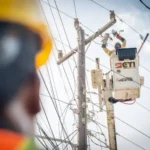The Montego West Village Benevolent Society (MWVBS) board has expressed frustration with what it describes as inadequate action from the municipal corporation and other regulatory bodies, which it says are shirking their responsibilities and leaving residents to fend for themselves. In a statement to the Sunday Observer, the board argued that these issues cannot be resolved merely by changing the gated status of the community or introducing new legislation. Instead, they insist that existing authorities need to enforce current standards and perform their duties effectively.
The board painted a bleak picture of government inaction, detailing a series of infrastructure issues that residents have faced. They pointed to rapidly deteriorating roads, vulnerabilities in the water piping infrastructure, and development walls erected without proper foundations, reinforcements, or quality concrete, leaving them susceptible to breaches. They also criticized the lack of water reserves, which they argue is indicative of poor work by the developer and a failure to adhere to public policy legislation on infrastructure.
In addition, the board reiterated past complaints about the failure to construct mandated retaining walls, which has left the community at risk of landslides and erosion. While some residents have taken it upon themselves to build these walls, the board continues to hope that the developer will address other outstanding issues.
Gore Homes, the developer behind Montego West Village, declined to comment on these concerns. However, documents seen by the Sunday Observer from the National Environment and Planning Agency (NEPA) confirm that some of the board’s worries are valid. An inspection conducted by NEPA on October 16, 2020, noted erosion on the slopes of several lots, and recommended a warning letter be issued for non-compliance with permit conditions.
St James Municipal Corporation Mayor Richard Vernon has pushed back against the MWVBS board’s claims, stating that certificates of compliance were issued for all seven phases of the Montego West Village project, meaning that the developer met all necessary requirements. Vernon also emphasized that individual homeowners are responsible for installing retaining walls on their lots, as outlined in the sales agreement. He further clarified that the issue of a missing boundary wall is a matter for residents to take up with the developer, as it was not a condition of approval or part of the plans.
The board has also raised concerns about flooding and mosquito issues, attributing these problems to the municipal corporation’s failure to maintain drains in the community. They also cited inadequate road maintenance, despite the developer’s contribution of approximately $20 million over two years to maintain the 10 kilometers of roads within Montego West Village. According to the board, this funding has only resulted in minor pothole repairs, leaving much of the road infrastructure to deteriorate rapidly.
Vernon disputed these claims, asserting that standards were met and compaction reports were provided by the developer. He stated that the roads are regularly inspected and repairs are planned for the community in the coming weeks. He also referenced property taxes, highlighting that over $1 billion remains unpaid by residents in gated and other formal communities across the municipality, which strains the resources available to maintain infrastructure in St James.
The MWVBS board, however, questioned the accuracy of the local authority’s data and the effectiveness of its efforts to ensure tax compliance. They urged the municipal corporation to stop making excuses and take necessary actions to ensure that residents pay their taxes and that community needs are addressed. They called for greater accountability and support, emphasizing the importance of public education and proactive enforcement.
Responding to these concerns, Vernon revealed that 55% of Montego West Village homeowners pay their property taxes, while the remaining 45% owe a total of $19.8 million. He acknowledged the challenges in collecting overdue taxes, citing difficulties in accessing the gated community and reaching residents who are often away at work during visits by compliance officers.
To improve tax collection, Vernon outlined several new measures, including an advertisement on the municipality’s website, the use of a town crier to remind residents about their tax obligations, early morning visits to catch homeowners before they leave for work, Saturday visits, and starting in November, serving summonses to those who owe property taxes, with court hearings scheduled for January.
Despite these initiatives, the MWVBS board remains skeptical about whether the local authority and other state agencies will take the necessary steps to support the community effectively.






